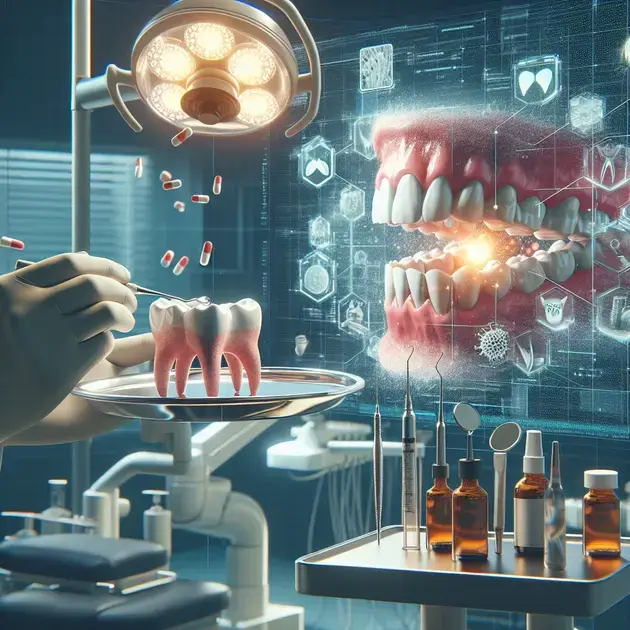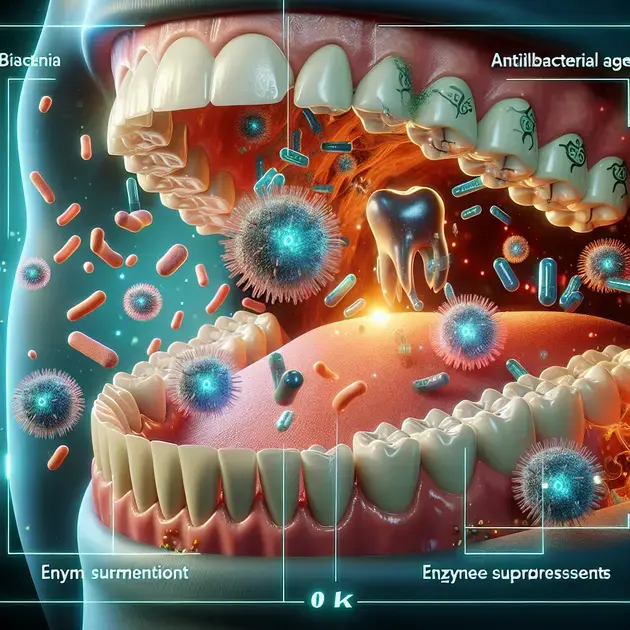Looking for effective medication for periodontitis? You’ve come to the right place. Periodontitis is a serious gum infection that damages the soft tissue and destroys the bone that supports your teeth. In this comprehensive guide, we will explore the most up-to-date treatment options available to combat this common oral health issue.
With advancements in dental technology and research, there are now various medications and treatment approaches that have shown promising results in managing and treating periodontitis. From antibiotics to surgical interventions, we will delve into the different options to help you make informed decisions about your oral health. Let’s dive into the world of periodontal medication and discover the most effective solutions for fighting this condition.

The Role of Medication in Treating Periodontitis
Medication plays a crucial role in the treatment of periodontitis, a serious gum infection that can damage the soft tissue and destroy the bone that supports your teeth. One effective medication option is using prescription antibiotics to combat the bacterial infection causing periodontitis. These antibiotics may come in the form of pills, mouth rinses, or gels. To access these medications, it is important to consult with a dentist or periodontist who can prescribe the appropriate course of treatment. Websites like Healthline provide detailed information on the types of antibiotics commonly used to treat periodontitis and their potential side effects.
Another essential medication for periodontitis is antimicrobial mouth rinses. These rinses can help reduce the amount of bacteria in your mouth, promoting gum health and preventing the progression of the infection. One popular antimicrobial mouth rinse is Listerine, which is widely available in stores and pharmacies. To use this medication effectively, follow the instructions on the label or consult with your dentist for personalized recommendations.
In severe cases of periodontitis, a dentist may recommend using prescription-strength mouthwashes containing chlorhexidine gluconate. These medicated mouthwashes can help control the growth of bacteria and reduce inflammation in the gums. Websites like Colgate offer insights on the benefits of using chlorhexidine gluconate mouthwashes and how to incorporate them into your oral hygiene routine.
For patients with advanced periodontitis, locally administered antibiotics such as Arestin may be prescribed. Arestin is a powder that is placed directly into the periodontal pockets during a dental visit. This localized treatment targets the infection at the site, promoting healing and preventing further tissue damage. Resources like the official Arestin website provide detailed instructions on the application of this medication and its efficacy in combating periodontitis.
As part of a comprehensive treatment plan for periodontitis, medications play a vital role in controlling the infection, reducing inflammation, and supporting gum health. By following the advice of dental professionals and utilizing the appropriate medications, individuals can effectively manage and improve their periodontal condition.
Exploring Non-Surgical Treatment Options
When addressing periodontitis, exploring non-surgical treatment options can be beneficial in managing the condition and preventing its progression. One common non-surgical treatment is scaling and root planing, also known as deep cleaning. This procedure involves removing plaque and tartar buildup from the teeth and smoothing the root surfaces to promote gum reattachment. Websites like WebMD offer detailed guides on the process of scaling and root planing and its effectiveness in treating periodontitis.
Another non-surgical approach to treating periodontitis is laser therapy. Laser technology can target and eliminate bacteria in the gum pockets while promoting the regeneration of healthy gum tissue. Dental clinics equipped with laser devices like Waterlase provide this advanced treatment option for patients with periodontal issues. To explore laser therapy as a non-surgical treatment for periodontitis, schedule a consultation with a laser dentistry provider in your area.
In some cases, adjunctive therapies such as locally delivered antimicrobials or host modulation agents may be recommended in conjunction with traditional periodontal treatments. These additional treatments can enhance the effectiveness of the primary therapy and improve overall periodontal health. Websites like Perio.org offer insights into the different types of adjunctive therapies available and their role in comprehensive periodontal care.
Oral irrigation devices, such as Waterpik, can also complement non-surgical periodontal treatments by delivering antimicrobial solutions or water to remove debris from the gum pockets. Using an oral irrigator as part of your daily oral hygiene routine can help improve gum health and reduce bacterial colonization. Consult with your dentist or periodontist to determine if incorporating oral irrigation into your regimen is suitable for your periodontal condition.
By exploring non-surgical treatment options for periodontitis, individuals can address their gum disease in a proactive manner and work towards achieving optimal oral health. Collaborating with dental professionals and adopting appropriate non-surgical therapies can lead to improved periodontal outcomes and a healthier smile.
Innovative Medication Therapies for Periodontitis
Innovative medication therapies are continuously being developed to enhance the treatment of periodontitis and improve patient outcomes. One emerging medication therapy is the use of probiotics to restore a healthy balance of oral bacteria and support gum health. Probiotic supplements containing beneficial strains of bacteria can help reduce inflammation and inhibit the growth of periodontal pathogens. Websites like PubMed provide research articles on the potential of probiotics in managing periodontitis and their impact on oral microbiota.
Another innovative medication therapy for periodontitis involves the use of enzymes that target and breakdown the biofilm formed by harmful bacteria in the mouth. These enzymes, such as those found in certain mouthwashes or gels, can disrupt the bacterial colonies and promote better plaque control. Stay updated on the latest advancements in enzymatic therapies for periodontitis by following oral health publications and consulting with your dental provider for personalized recommendations.
Nanoparticle-based drug delivery systems are also being explored for their potential in treating periodontitis more effectively. By encapsulating antimicrobial agents or anti-inflammatory drugs in nanoparticles, targeted delivery to the periodontal pockets can be achieved, maximizing therapeutic benefits and minimizing side effects. Research journals like ScienceDirect publish studies on the application of nanoparticle technology in combating periodontal infections and its future implications in clinical practice.
Pharmacogenomics, the study of how individual genetic variations influence a person’s response to medications, is paving the way for personalized medicine in periodontal treatment. By analyzing genetic markers related to drug metabolism and treatment efficacy, dentists can tailor medication therapies to suit the unique genetic profiles of their patients. Explore the potential of pharmacogenomics in periodontitis management through scientific databases and genetic testing services offered by healthcare providers.
Embracing innovative medication therapies for periodontitis can revolutionize the way we approach gum disease treatment and optimize patient care. By staying informed about cutting-edge advancements in medication research and working closely with dental professionals, individuals can access personalized and effective therapies to combat periodontitis and preserve their oral health.

**Exploring Non-Surgical Treatment Options**
Periodontitis is a serious gum infection that damages the soft tissue and destroys the bone that supports your teeth. In addition to good oral hygiene practices, there are non-surgical treatment options available to help manage this condition.
One common non-surgical treatment option for periodontitis is scaling and root planing. This procedure involves removing plaque and tartar from the teeth and root surfaces, as well as smoothing out rough spots on the roots to help prevent bacteria from accumulating.
Another non-surgical treatment option is the use of antibiotics. Antibiotics can be prescribed to help control bacterial infection and reduce inflammation in the gums. They can be taken orally or applied directly to the infected areas.
In some cases, laser therapy may be recommended as a non-surgical treatment option for periodontitis. This involves using laser energy to remove diseased tissue and bacteria from the gums, promoting healing and reducing the depth of periodontal pockets.
Overall, exploring non-surgical treatment options for periodontitis can help improve the health of your gums and prevent further damage to the supporting structures of your teeth.
**Innovative Medication Therapies for Periodontitis**
When traditional treatments for periodontitis are not enough, innovative medication therapies can offer additional benefits in managing this condition. These medications can help control bacterial infections, reduce inflammation, and promote healing in the gums.
One innovative medication therapy for periodontitis is the use of local antibiotics. These antibiotics are placed directly into the periodontal pockets to target and eliminate the bacteria causing the infection, helping to reduce inflammation and promote tissue regeneration.
Another innovative medication therapy is the use of enzyme suppressants. These medications work by inhibiting the enzymes that break down the connective tissue in the gums, helping to prevent further damage and promoting healing.
Some medications may also be used to target specific strains of bacteria known to be associated with periodontitis, helping to control the infection and reduce the risk of recurrence.
Overall, innovative medication therapies for periodontitis can provide targeted treatment to help improve the health of your gums and manage this chronic condition effectively.
**Lifestyle Modifications for Managing Periodontitis**
In addition to professional treatments, making lifestyle modifications can also play a key role in managing periodontitis and promoting gum health. By adopting healthy habits and practices, you can help prevent further damage to your gums and support the success of treatment.
One important lifestyle modification for managing periodontitis is maintaining a good oral hygiene routine. This includes brushing your teeth at least twice a day, flossing daily, and using an antiseptic mouthwash to help control bacteria in the mouth.
Quitting smoking is another crucial lifestyle change for managing periodontitis. Smoking can weaken your immune system, making it harder for your body to fight off infections and heal from gum disease. By quitting smoking, you can improve your overall gum health and reduce the risk of complications.
Adopting a healthy diet rich in fruits, vegetables, and lean proteins can also benefit your gum health. Nutrient-rich foods can help support your immune system and promote healing in the gums, while avoiding sugary snacks and beverages can help prevent plaque buildup and inflammation.
Incorporating stress-reducing activities such as meditation, yoga, or exercise into your daily routine can also help manage periodontitis. Chronic stress can weaken your immune system and increase inflammation in the body, making it harder to heal from gum disease. By reducing stress, you can support your body’s natural healing processes and improve your overall gum health.
Conclusion
Periodontitis, a severe gum infection, poses a risk to dental health by damaging soft tissues and bones supporting teeth. Non-surgical treatments like scaling and root planing, antibiotics, and laser therapy offer effective ways to manage this condition beyond basic oral hygiene practices. These methods aim to remove plaque, control bacterial infections, and promote healing in the gums, ultimately enhancing overall gum health and preventing further structural damage.
Innovative medication therapies bring added benefits for periodontitis cases resistant to traditional treatments. Approaches such as local antibiotics target specific bacteria within periodontal pockets, reducing inflammation and facilitating tissue regeneration. Enzyme suppressants play a vital role in inhibiting tissue breakdown, aiding in prevention of damage and supporting the healing process. These targeted therapies tailored to combat bacterial strains linked to periodontitis contribute to the effective management of this chronic condition, elevating gum health outcomes.
Additionally, lifestyle modifications play a critical role in sustaining gum health and managing periodontitis. Maintaining a robust oral hygiene routine, including regular brushing, flossing, and mouthwash use, becomes foundational in preventing gum damage. Quitting smoking, which weakens immune defenses, can significantly improve gum health and decrease the risk of complications. Incorporating a nutrient-rich diet and avoiding sugary foods help support the immune system and promote healing, while engaging in stress-reducing activities like meditation or exercise can aid in managing periodontitis by reducing inflammation and supporting the body’s natural healing processes.



